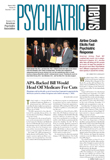Candidate’s Views
What is important? Many of us have reviewed our core personal values over the last several months. As psychiatrists, our personal values are often intertwined with professional values. We have opportunities that others do not have to promote personal and social well-being. The work that we do is valuable to our patients. The work that we do is also valuable to our society. Psychiatry is a profession that provides us with many opportunities.
Values are demonstrated or operationalized through the projects and priorities we choose to spend our time on. One is productive when working on projects that are consistent with values. Through my appointment by Gov. Jim Gilmore as inspector general to the Virginia Department of Mental Health, Mental Retardation, and Substance Abuse Services (DMHMRSAS), I have been given the opportunity to work on projects that are important to the well-being of persons served by the state mental health, mental retardation, and substance abuse system in Virginia. My unique position involves travel to hospitals and other settings throughout our commonwealth to review and report to the governor and the citizens of Virginia on the quality of clinical services designed to meet the needs of these individuals. During the first two years in this office, over 400 recommendations for performance improvement were made and acted upon by the Virginia DMHMRSAS. This work is consistent with my professional values. These values have been refined and enhanced through active involvement in professional organizations such as APA, where I serve as an Assembly representative from Virginia; the American Association of Community Psychiatrists, where I serve as a national board member; the newly founded and vibrant Virginia Association of Community Psychiatrists; and the Psychiatric Society of Virginia.
Is APA working on projects that are concordant with APA core values and the values of its members? APA, on behalf of our profession, spent much of the Decade of the Brain fighting the imposition that managed care inflicted upon our profession. We have not clearly prevailed; however, critical advances have been made. These include support of parity, privacy, the development of practice guidelines, and a genuine effort to reorganize APA. Our profession and patients have been positively impacted by the availability of superior medication products for the treatment of many mental illnesses.
The time is right for APA to take a national proactive leadership role in the direction of clinical practice designed to treat the severely and persistently mentally ill. State mental health systems all around our nation are struggling to define how state mental hospitals are to be used if at all, and which, if any, mental health services to support. Each state government takes a different path and is influenced a great deal by funding. Increasingly the availability of federal Medicaid money defines the development of state services. APA has veered from its roots as an organization of state hospital superintendents who serve those with chronic mental disabilities. As your elected official to the Board of Trustees, I would like to support APA in becoming more involved in providing national clinical leadership through the promotion of sensible, evidence-based services for those with chronic mental disabilities. This is concordant with the core values of APA and its members. This is important for our profession and our patients.
Primary Loci of Work and Sources of Income
Work: 100%—Inspector general, state of Virginia government
Income: 100%—Inspector general, state of Virginia government

